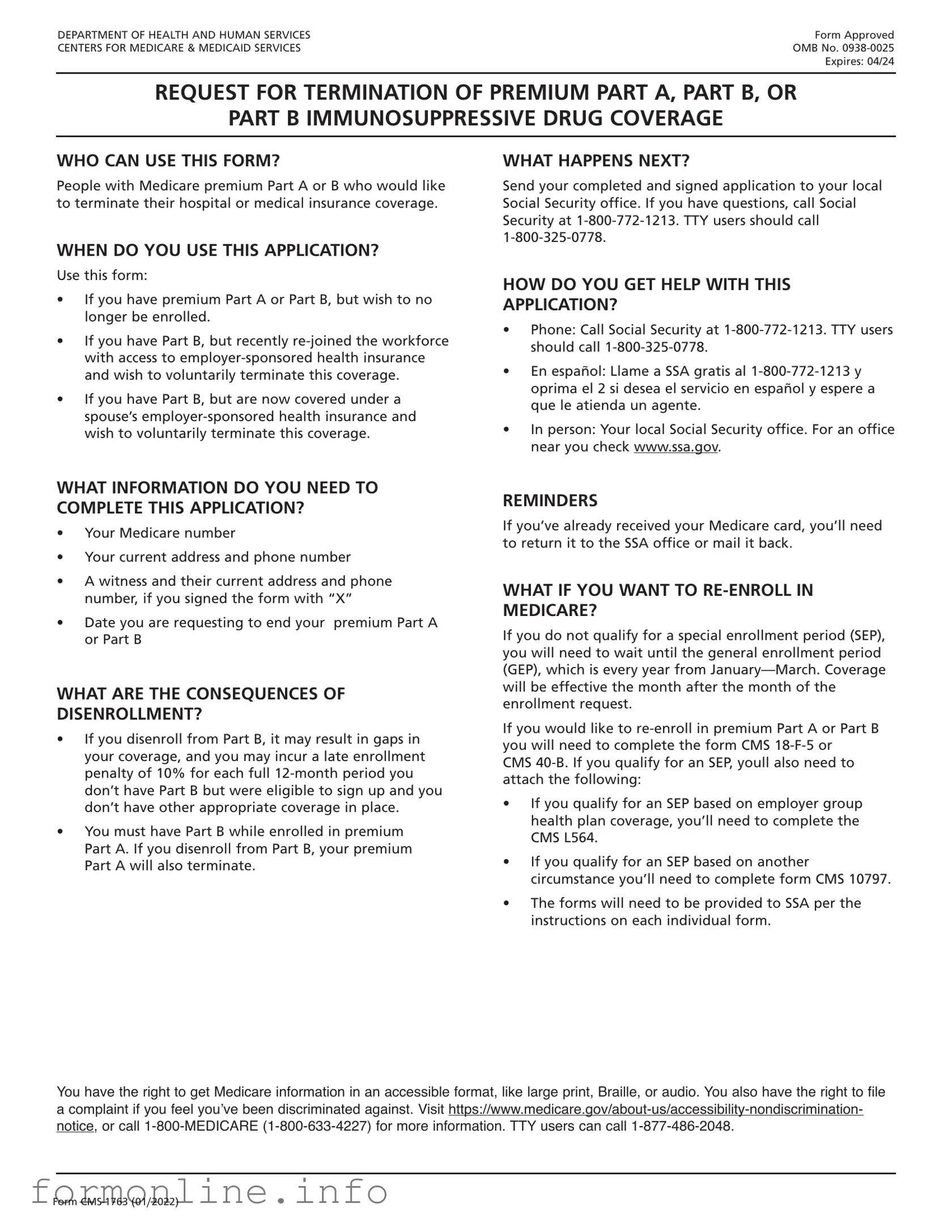Fill Out a Valid CMS-1763 Exp Form
The CMS-1763 Exp form plays a crucial role in the healthcare landscape, particularly for individuals seeking to maintain their Medicare coverage. This form is primarily used by beneficiaries who wish to request an extension of their Medicare coverage due to certain circumstances. It is important for users to understand the specific situations that warrant the use of this form, such as when a beneficiary is facing a temporary loss of coverage or needs additional time to provide necessary documentation. The CMS-1763 Exp form ensures that eligible individuals can navigate the complexities of Medicare with greater ease, allowing them to retain access to essential medical services. Moreover, filling out this form accurately and submitting it on time is vital for a smooth process. By familiarizing oneself with the key sections of the form, beneficiaries can better advocate for their healthcare needs and avoid potential gaps in coverage.
Common mistakes
-
Incomplete Information: Many individuals fail to provide all necessary details. This can include missing personal information or omitting required signatures.
-
Incorrect Dates: Entering the wrong dates can lead to confusion. Ensure that all dates, including the date of signing, are accurate.
-
Not Reading Instructions: Skipping the instructions can result in errors. It's essential to thoroughly read the guidelines provided with the form.
-
Using the Wrong Version: Submitting an outdated version of the form can cause delays. Always check for the most current version before filling it out.
-
Failure to Review: Not double-checking the completed form can lead to overlooked mistakes. A careful review can catch errors before submission.
-
Ignoring Submission Guidelines: Each form has specific submission instructions. Failing to follow these can result in processing delays or rejection.
-
Neglecting to Keep a Copy: Many forget to make a copy of the submitted form. Keeping a record can be helpful for future reference or in case of issues.
Preview - CMS-1763 Exp Form

DEPARTMENT OF HEALTH AND HUMAN SERVICES |
Form Approved |
CENTERS FOR MEDICARE & MEDICAID SERVICES |
OMB No. |
|
Expires: 04/24 |
REQUEST FOR TERMINATION OF PREMIUM PART A, PART B, OR
PART B IMMUNOSUPPRESSIVE DRUG COVERAGE
WHO CAN USE THIS FORM?
People with Medicare premium Part A or B who would like to terminate their hospital or medical insurance coverage.
WHEN DO YOU USE THIS APPLICATION?
Use this form:
•If you have premium Part A or Part B, but wish to no longer be enrolled.
•If you have Part B, but recently
•If you have Part B, but are now covered under a spouse’s
WHAT HAPPENS NEXT?
Send your completed and signed application to your local Social Security office. If you have questions, call Social Security at
HOW DO YOU GET HELP WITH THIS
APPLICATION?
•Phone: Call Social Security at
•En español: Llame a SSA gratis al
•In person: Your local Social Security office. For an office near you check www.ssa.gov.
WHAT INFORMATION DO YOU NEED TO COMPLETE THIS APPLICATION?
•Your Medicare number
•Your current address and phone number
•A witness and their current address and phone number, if you signed the form with “X”
•Date you are requesting to end your premium Part A or Part B
WHAT ARE THE CONSEQUENCES OF
DISENROLLMENT?
•If you disenroll from Part B, it may result in gaps in your coverage, and you may incur a late enrollment penalty of 10% for each full
•You must have Part B while enrolled in premium Part A. If you disenroll from Part B, your premium Part A will also terminate.
REMINDERS
If you’ve already received your Medicare card, you’ll need to return it to the SSA office or mail it back.
WHAT IF YOU WANT TO
If you do not qualify for a special enrollment period (SEP), you will need to wait until the general enrollment period (GEP), which is every year from
If you would like to
CMS
•If you qualify for an SEP based on employer group health plan coverage, you’ll need to complete the CMS L564.
•If you qualify for an SEP based on another circumstance you’ll need to complete form CMS 10797.
•The forms will need to be provided to SSA per the instructions on each individual form.
You have the right to get Medicare information in an accessible format, like large print, Braille, or audio. You also have the right to file a complaint if you feel you’ve been discriminated against. Visit
Form

DEPARTMENT OF HEALTH AND HUMAN SERVICES CENTERS FOR MEDICARE & MEDICAID SERVICES
REQUEST FOR TERMINATION OF PREMIUM PART A, PART B,
OR PART B IMMUNOSUPPRESSIVE DRUG COVERAGE
The completion of this form is needed to document your voluntary request for termination of Medicare coverage as permitted under the Code of Federal Regulations. Section 1838(b) and 1818A(c)(2)(B) of the Social Security Act require filing of notice advising the Administration when termination of Medicare coverage is requested. While you are not required to give your reasons for requesting termination, the information given will be used to document your understanding of the effects of your request.
DO NOT WRITE IN THIS SPACE
NAME OF ENROLLEE (Please Print)
MEDICARE NUMBER
NAME OF PERSON, IF OTHER THAN ENROLLEE, WHO IS EXECUTING THIS REQUEST.
THIS IS A REQUEST FOR TERMINATION OF |
DATE PART A |
DATE PART B |
DATE PBID |
HOSPITAL INSURANCE |
WILL END |
WILL END |
WILL END |
MEDICAL INSURANCE |
|
|
|
PART B IMMUNOSUPPRESSIVE DRUG COVERAGE |
|
|
|
|
|
|
|
I request termination of my enrollment under the above sections of title XVIII of the Social Security Act, as amended, for the reason(s) stated below:
I UNDERSTAND THAT IF I AM REQUIRED TO PAY FOR MY HOSPITAL INSURANCE, THE TERMINATION OF MY PART B COVERAGE WILL ALSO END MY PART A COVERAGE.
If this request has been signed by mark (X), two witnesses who know the applicant must sign below, giving their full addresses.
1. NAME OF WITNESS
SIGNATURE (Write in Ink)
SIGN
HERE
ADDRESS (Number and Street, City, State and Zip Code)
MAILING ADDRESS (Number and Street)
2. NAME OF WITNESS
CITY, STATE, ZIP CODE
ADDRESS (Number and Street, City, State and Zip Code)
DATE (Month, Day and Year)
TELEPHONE NUMBER
According to the Paperwork Reduction Act of 1995, no persons are required to respond to a collection of information unless it displays a valid OMB control number. The valid OMB control number for this information collection is
Form
Other PDF Templates
Nc-4p - Every filer should consider their unique tax situation when completing the NC-4.
For more information regarding the WC-1 Georgia form and its requirements, you can visit georgiapdf.com/, where you will find guidance and resources to assist you in completing this important document.
Horse Training Agreement Template - The agreement prohibits unauthorized use of the horse by individuals who are not the Owner.
Documents used along the form
The CMS-1763 Exp form is used primarily to request the termination of Medicare Part B coverage. Alongside this form, several other documents may be necessary to ensure a smooth process. Here are some common forms and documents that often accompany the CMS-1763 Exp form:
- CMS-40B Form: This form is used to apply for Medicare Part B. It is essential for individuals who want to enroll or reenroll in Part B coverage after initially declining it.
- CMS-L564 Form: This document serves as proof of employment or group health coverage. It is often required when individuals are applying for a Special Enrollment Period.
- Medicare Card: The Medicare card shows enrollment in Medicare and includes important information such as the individual's Medicare number and coverage details.
- Mobile Home Bill of Sale: This form is essential for the legal transfer of ownership of a mobile home and includes crucial details about the parties involved and the sale terms. For more information, visit the Mobile Home Bill of Sale.
- Proof of Residency: Documents such as utility bills or lease agreements may be needed to verify the individual's current address, especially if they are moving and need to update their Medicare information.
- Form SSA-561: This form is used to request a reconsideration of a Medicare decision. If an individual disagrees with a determination made by Medicare, this form allows them to appeal.
- Medicare Summary Notice (MSN): This notice provides a summary of services received and the costs associated with them. It is useful for understanding billing and coverage decisions.
- Authorization to Disclose Personal Health Information: This document allows individuals to authorize a third party to access their medical records or Medicare information, which can be crucial for family members or caregivers assisting with the process.
Having these documents ready can facilitate the process of managing Medicare coverage. Each form serves a specific purpose and helps ensure that individuals receive the benefits they are entitled to without unnecessary delays.
Similar forms
The CMS-1763 Exp form, often used in the context of Medicare, is similar to the CMS-40B form. The CMS-40B is a request for a Special Enrollment Period for Medicare Part B. Like the CMS-1763, it is essential for individuals who are looking to change their enrollment status. Both forms require personal information, including the individual’s Medicare number and details regarding the qualifying event that prompts the request. Timeliness is critical for both forms, as they must be submitted within specific time frames to ensure proper processing.
Another document that bears resemblance to the CMS-1763 is the CMS-10106 form, which is used for requesting a Medicare Savings Program. This form also serves to assist individuals in managing their Medicare coverage. It collects similar personal and financial information to determine eligibility for additional assistance. Both forms aim to provide beneficiaries with better access to healthcare services while ensuring compliance with Medicare guidelines.
The CMS-1763 Exp form is also akin to the CMS-855I form, which is an application for Medicare enrollment for individual providers. While the CMS-855I focuses on healthcare providers rather than beneficiaries, both documents share the common goal of facilitating access to Medicare services. They require detailed information about the applicant’s qualifications and background, ensuring that only eligible individuals receive Medicare benefits.
In addition, the CMS-1763 is similar to the CMS-2728 form, which is used for reporting end-stage renal disease (ESRD) patients. This form is vital for establishing eligibility for Medicare coverage due to ESRD. Both forms require specific medical information and personal data to ensure that individuals receive the appropriate benefits in a timely manner. The urgency in processing these forms highlights the critical nature of healthcare access for those affected.
The CMS-1500 form also shares similarities with the CMS-1763. This form is used for billing Medicare for medical services provided to patients. While the CMS-1500 focuses on the provider's side, both documents require accurate patient information and detailed descriptions of services or changes to enrollment. The precision needed in both forms underscores the importance of maintaining accurate records within the Medicare system.
Moreover, the CMS-1490S form is comparable to the CMS-1763 in that it is used for requesting a Medicare Part D plan disenrollment. This form is crucial for individuals who wish to change their prescription drug coverage. Both forms require beneficiaries to provide specific reasons for their requests, ensuring that Medicare can effectively manage its services and respond to the needs of its members.
The Texas RV Bill of Sale form is essential for ensuring a transparent transaction when buying or selling a recreational vehicle, providing clarity and legal protection for both parties. For those considering the purchase of an RV in Texas, having access to the appropriate documentation is crucial. You can find more information and resources at autobillofsaleform.com/rv-bill-of-sale-form/texas-rv-bill-of-sale-form/, which outlines the necessary steps for properly executing a sale and securing ownership. This document not only facilitates the transfer of ownership but also assists in the registration and taxation processes related to the vehicle.
Finally, the CMS-10165 form, which is used for requesting a Medicare Advantage plan enrollment, is another document similar to the CMS-1763. This form collects necessary personal information and eligibility criteria, much like the CMS-1763. Both forms serve to streamline the enrollment process for Medicare beneficiaries, emphasizing the importance of accurate and timely submissions to avoid any disruption in coverage.
Dos and Don'ts
When filling out the CMS-1763 Exp form, it’s important to follow certain guidelines to ensure your application is processed smoothly. Here’s a helpful list of things you should and shouldn’t do:
- Do read the instructions carefully before starting the form.
- Do provide accurate and complete information.
- Do double-check your entries for any errors or omissions.
- Do sign and date the form where required.
- Don’t leave any sections blank unless instructed to do so.
- Don’t submit the form without reviewing it thoroughly.
By adhering to these guidelines, you can help ensure a smoother process for your application. Proper attention to detail can save time and reduce the chances of delays.
Key takeaways
Filling out the CMS-1763 Exp form is a critical step for those seeking to request a termination of Medicare coverage. Understanding the process can help ensure a smooth experience. Here are some key takeaways:
- Ensure you have the correct form. The CMS-1763 Exp form is specifically designed for terminating Medicare coverage.
- Provide accurate personal information. This includes your name, Medicare number, and contact details.
- Clearly indicate the reason for termination. This could be due to various factors, such as moving out of the service area or no longer needing coverage.
- Review the instructions carefully. Each section of the form has specific requirements that must be followed.
- Sign and date the form. An unsigned form may delay the processing of your request.
- Submit the form to the appropriate address. Check the latest guidelines to ensure it goes to the right location.
- Keep a copy of the completed form for your records. This can be useful for future reference.
- Monitor your Medicare account for confirmation. It may take some time to process your request.
- Contact Medicare if you have questions. They can provide assistance and clarification as needed.
By following these steps, you can navigate the process of terminating your Medicare coverage with confidence.
How to Use CMS-1763 Exp
Once you have the CMS-1763 Exp form ready, it’s important to fill it out accurately to ensure that your request is processed smoothly. Following the steps below will help you complete the form correctly.
- Begin by entering your personal information in the designated fields. This includes your full name, address, and contact details.
- Next, provide your Medicare number. This number is typically found on your Medicare card.
- Indicate the reason for completing the form. There will be a section where you can select or describe your reason.
- Carefully read through the certification statement. You may need to check a box to confirm your understanding and agreement.
- Sign and date the form at the bottom. This is crucial as it verifies the information provided is accurate.
- Finally, review the entire form for any errors or omissions before submitting it.
After completing the form, make sure to send it to the appropriate address as indicated on the form itself. Keep a copy for your records, as it may be useful for future reference.
